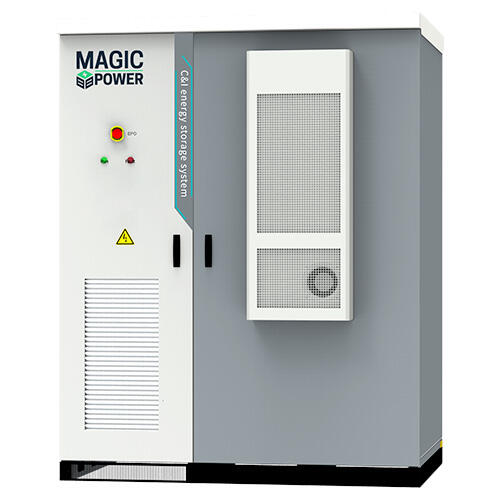In a sense, it is used as the world's largest rechargeable battery where excess electricity generated from renewable energy sources like wind and solar could be stored in batteries. These saved energy remnants that automatically switch itself on when the regular supply of power is disrupted, or during peak hours. Battery storage systems are gaining popularity as the world moves towards cleaner energy alternatives and decentralized power generation.
1) Core Components of Battery Storage A solar battery storage system essentially have three core components-t BATTERY:- The part which contain the electric energy in her is core of battery. Inverter - converts direct current (DC) power from a battery into the alternating current (AC) needed for use in your home or business. On the other hand, it is the charge controller that oversees charging and discharging of a battery so as to protect against overcharge or deep discharge which may destroy your battery.
Benefits of Battery Storage Systems in Reducing Energy costs
When paired with battery storage, homeowners and businesses are able to reduce energy costs by using stored energy during peak consumption times when electricity is most expensive. For example, if a homeowner has solar panels that generate more electricity than the home needs during daylight hours and is exporting that surplus to neighbouring properties at say 5 cents per kWhr they might be better off storing all of energy generated from their own roof in a battery, then drawing on this power when needed at household rates in the evening (say between 33-36c/kWh required). By selling excess electricity when the price is good for homeowners and then using that money to buy cheaper grid power, net-metered homes can reduce their reliance on expensive grid-power.
In addition, the battery storage systems help to decrease dependence on grid power and this is a significant factor for providing electricity in a stable manner as well it reduces vulnerability of blackout. In the event of a natural disaster or other emergency, locals can count on at least their home and business lights to be kept on with battery storage systems in place.
Battery Storage Batter storage systems also have a very positive reinforcement in the field of sustainable living practices. This storage of excess power allows individual home and business owners to reduce their carbon emissions - each little but could also help the fight against climate change. By using renewable energy sources (such as solar or wind) in conjunction with a battery storage system, residential and commercial users can slash their reliance on coal-fired electricity from the grid and save money.
Also, electric vehicles can be easily integrated with these systems to form a complete sustainable transport system. People can drastically cut the amount of greenhouse gases they emit by using renewable energy to power their homes and cars.

There is growing demand in the market, and technology companies continue to announce new innovations within this area of business. One of the most notable advancements over this last generation has been lithium-ion batteries becoming more or less ubiquitous in an industry wide context for energy storage systems. Lithium-ion batteries are known for their significantly improved efficiency, longevity and life span over traditional lead-acid batteries.
Developers are working on smart batteries - this technology utilizes artificial intelligence to improve the efficiency of battery usage and performance. Naturally, smart batteries will be able to monitor energy consumption patterns and optimise the charging/discharging pattern of the battery for ideal use of energy.

Domestic battery storage systems are a boon for homeowners, just as they can have significant benefits for any business. This can help to lower energy costs and provide a more reliable source of power, especially in commercial installations that have high demands on their energy consumption. Utility companies may offer businesses incentives to deploy battery storage systems and produce excess energy that can be returned to the grid.
Moreover, these systems allow companies to meet their sustainability goals and reduce the carbon emissions. The integration of renewable energy sources with battery storage greatly reduces their environmental footprint and simultaneously lowers the power bill for companies.

As the global transition to renewable and decentralized power generation keeps increasing, so does this need for battery storage systems. These systems deliver value-add to the homeowner as well as business (by way of costs) and unlock a whole new paradigm for ensuring constant power supply along with contributing toward sustainable development. The reality is that battery storage systems are on the verge of becoming even more cost-effective and efficient as advancements in technology continue to materialize, thus offering a very real way for both individuals and organizations to transform their energy consumption practices surrounding sustainable living.
Customer satisfaction core mission. offer comprehensive customer support services battery storage system best user experience possible. includes complete technical support during purchase, gives clients confidence peace mind throughout journey.
main focus CI Energy Storage Integration Services. We a offer battery storage system Energy Storage Systems Portable Power Stations specialize tailor-made energy solutions tailored variety scenario scenarios.
We're committed carbon neutrality battery storage system offer most advanced energy storage solutions globe. help customers achieve sustainable energy environmental goals, drive towards greener, sustainable future.
battery storage system most advanced technology available provide high-quality reliable energy storage solutions. Utilizing EMS, automate strategies use electricity efficiently enhance functions products. system manages usage autonomously based factors weather electricity prices, allowing users optimize usage according own preferences best conditions.